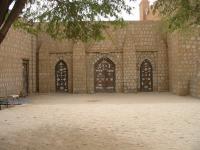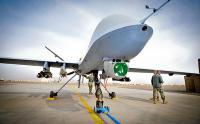-
U.K. to deploy troops in Somalia, South Sudan to foster “less terrorism and less migration”

British prime minister David Cameron has said that hundreds of British troops will be deployed to Somalia and South Sudan to train African peacekeeping forces in order to foster “less terrorism and less migration.” Over the years the United Kingdom has contributed to many peacekeeping missions, but now its role is largely limited to providing about 280 troops participating in the current mission in Cyprus. The United Kingdom has also given about £260 million in aid to South Sudan since the start of the civil war in December 2013.
-
-
Islamist who took part in destroying Timbuktu monuments sent to the Hague to face charges

An Islamic extremist charged with involvement in the destruction of religious buildings in the historic city of Timbuktu in Mali in 2012 has been arrested Saturday and sent to the International Criminal Court (ICC). Legal scholars note that Ahmad Al Mahdi Al Faqi, aka Abu Tourab, is the first suspect in ICC custody charged with destroying religious or historical monuments, which is a war crime. The court said in a statement he was a member of Ansar Dine, an Islamic extremist group with links to al-Qaeda which ruled the break-away northern Mali from April 2012 to February 2013. Ansar Dine joined with separatist Tuareg forces to drive the Mali army out of northern Mali – an area the size of France – and declare the independent state of Azawad. Abu Tourab is charged with participation in the destruction of ten historic buildings, including mausoleums and a mosque in Timbuktu.
-
-
Bi-partisan Senate bill to make it easier for terrorism victims to sue foreign governments
A bill sponsored by a bipartisan group of Senators and which was introduced last week would make it easier for victims of acts of terrorism to sue foreign governments and private-sector bodies financing and supporting terrorism. In December, Senators passed, by unanimous consent, an identical bill, but the House adjourned before taking up the measure. The bill’s sponsors said that the language is aimed at federal appellate court rulings which created uncertainty about when terror victims can sue.
-
-
The stories of Islamic State defectors
Much has been written about the young men and women who join the Islamic State. We are familiar with their biographies and pathways, backgrounds and motivations. But virtually nothing is known about those who quit: the “defectors” who did not like what they saw, abandoned their comrades, and fled the Islamic State. Yet their stories could be key to stopping the flow of foreign fighters, countering the group’s propaganda, and exposing its lies and hypocrisy.
-
-
UN inquiry to determine who is responsible for chemical attacks in Syria
Russia has withdrawn its objections to a UN investigation into identifying the culprits responsible for chemical attacks in Syria, allowing a probe to begin, UN diplomats said Thursday. For the last two years, Russia had insisted that a series of UN investigative teams sent to Syria would be limited to finding out whether or not chemical weapons had been used, but would be barred from identifying who was responsible for launching them.
-
-
Insider threats, organizational rigidity pose challenges for U.S. national security: Study
U.S. national security faces rising challenges from insider threats and organizational rigidity, a Stanford professor says. A new study says that in the past five years, seemingly trustworthy U.S. military and intelligence insiders have been responsible for a number of national security incidents, including the WikiLeaks publications and the 2009 attack at Fort Hood in Texas that killed 13 and injured more than 30. The study’s author acknowledges the difficulties of learning lessons from tragedies like 9/11, the NASA space shuttle accidents, and the 2009 Fort Hood shooting. She notes that policymakers tend to attribute failure to people and policies. While seemingly hidden at times, the organizational roots of disaster are much more important than many think, she added.
-
-
Remains of two IRA “disappeared” found and identified
Two bodies found in an Irish bog were confirmed by DNA tests to be the remains of Séamus Wright and Kevin McKee, two of the IRA’s “disappeared.” The two members of the Provisional IRA (PIRA) in west Belfast vanished in 1972, and were likely kidnapped, interrogated, then killed by the PIRA. Of the seventeen people killed by the IRA and then disappeared during the Northern Ireland Troubles, the remains of thirteen have been found and identified. Four people remain on the disappeared list.
-
-
Data show drone attacks doomed to fail against ISIS in Syria

This week, the Washington Post published a story about a new U.S. plan to use lethal drone strikes in Syria to destroy ISIS capabilities on the ground. The desire to do something — anything — to destroy the capabilities of a group so luridly destructive is understandable, but our haste to show results will likely result in a hollow victory at best. But there is a problem: there’s no evidence that drone strikes work. On the contrary, ample evidence shows drone strikes have not made Americans safer or reduced the overall level of terrorist capability. The strikes amount to little more than a waste of life, political capital, and resources. Drones cannot deliver victory over ISIS, but in any event, lacking a cohesive, articulate political strategy for governance and post-ISIS reconstruction, no military solution can produce the results we’re looking for. Lacking the political strategy, more of the same in Syria promises no better.
-
-
A first: U.K. drone strike kills Briton in Syria
British prime minister David Cameron revealed that a U.K. drone strike, which he had authorized, has targeted and killed Reyaad Khan, 21, a U.K. citizen who was a senior prominent member of Islamic State. It was the first targeted killing of a British citizen by U.K. drone. Another British citizen who was an ISIS member, Ruhul Amin, 26, was in the car carrying Khan and was also killed in the attack. Cameron said that three days later, a U.S. drone strike, carried out in coordination with the United Kingdom, killed a third British citizen — Junaid Hussain, 21. The Obama administration has said that only one American citizen, Anwar al-Awlaki, was taken out in a targeted killing.
-
-
Mighty Saber demonstrates post-nuclear detonation technical forensics capabilities
In late 2013, a team of more than fifty scientists from across the U.S. laboratory and industrial complex began preparing for Mighty Saber with the goal of demonstrating and evaluating post-detonation technical nuclear forensics capabilities following a simulated detonation of a nuclear device in an urban environment. Mighty Saber, which ran from 27 July to 21 August 2015, successfully met each of its objectives, including demonstrating U.S. government post- detonation nuclear forensics processes; the value of prompt diagnostics data provided by the Discreet Oculus ground-based sensor network; and how prompt diagnostics complements radiochemistry in providing a robust post-detonation nuclear forensics capability.
-
-
Determining the age of fingerprints
Watch the imprint of a tire track in soft mud, and it will slowly blur, the ridges of the pattern gradually flowing into the valleys. Researchers have tested the theory that a similar effect could be used to give forensic scientists something they’ve long wished for: A way to date fingerprints. Even the approximate age of a fingerprint can have a critical bearing on forensic results, as it can rule out some prints as being too old to be relevant to a crime scene. Military forensics experts would like to be able to date the multitude of fingerprints found on improvised bombs used by insurgents to winnow out prints of individuals who may simply have handled the components in a shop from those of the actual bombmakers.
-
-
Case closed: French judges end Yasser Arafat murder-by-radioactive-poisoning inquiry
French judges who were investigating charges by the Palestinian Authority and the widow of Yasser Arafat that he was murdered by being poisoned with radioactive material, have closed the case without bringing any charges. Arafat died in November 2004, aged 75, in Percy military hospital near Paris after developing stomach pains and exhibiting symptoms of a more general deterioration while living under Israeli siege at his partially destroyed headquarters in Ramallah. In 2012 a team of Swiss scientists found elevated levels of polonium-210 and lead-210 in tissue samples taken from his exhumed body, but French and Russian scientists who examined the same tissue samples did not find abnormal radiation levels and dismissed the Swiss findings as resulting from methodological errors.
-
-
Lost generation: Wars prevent 13m children in Middle East, north Africa from going to school
The UN children’s fund, in a report issued earlier today (Thursday) said that conflicts across the Middle East and North Africa have been preventing more than thirteen million children from attending school, undermining their hopes for a better future. “We’re on the verge of losing an entire generation of children in the Middle East and North Africa,” UNICEF regional director said.
-
-
More minorities join the sovereign citizen movement

The sovereign citizen movement, the roots of which lie in white separatism and anti-Semitism, now welcomes non-white adherents. Especially susceptible to recruitment efforts by the movement are African Americans – called “Moorish Americans” or “Moorish Natives” by movement members – from poor and neglected neighborhoods.“They are much more reflective of the demographics of society today,” a former FBI case manager notes.
-
-
Terrorist attacks involving firearms cause more fatalities than attacks using explosives
New background report examines use of firearms in terrorist attacks. The report finds that even though the use of explosives has the potential to cause exceptionally high numbers of casualties, in general, attacks involving firearms were more likely to be lethal.
-
More headlines
The long view
How Male Grievance Fuels Radicalization and Extremist Violence
Social extremism is evolving in reach and form. While traditional racial supremacy ideologies remain, contemporary movements are now often fueled by something more personal and emotionally resonant: male grievance.
